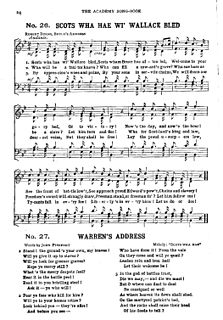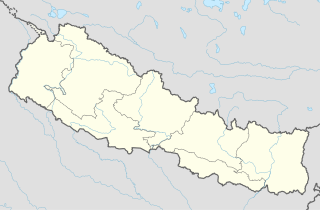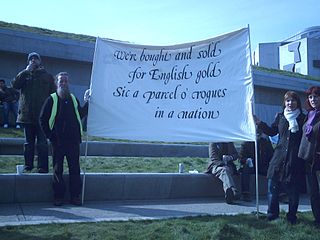 W
W"Auld Lang Syne" is a popular song and poem, particularly in the English-speaking world. It is traditionally used to bid farewell to the old year at the stroke of midnight on New Year's Eve. By extension, it is also sung at funerals, graduations, and as a farewell or ending to other occasions; for instance many branches of the Scouting movement use it to close jamborees and other functions.
 W
WBabes in the Wood is a traditional English children's tale, as well as a popular pantomime subject. It has also been the name of some other unrelated works. The expression has passed into common language, referring to inexperienced innocents entering unawares into any potentially dangerous or hostile situation. A number of child murder cases have been referred to in the media as the Babes in the Wood murders.
 W
WBorder ballads are a group of songs in the long tradition of balladry collected from the Anglo-Scottish border. Like all traditional ballads, they were traditionally sung unaccompanied. There may be a repeating motif, but there is no "chorus" as in most popular songs. The supernatural is a common theme in border ballads, as are recountings of raids and battles.
 W
W"The Derby Ram" or "As I was Going to Derby" is a traditional tall tale English folk song that tells the story of a ram of gargantuan proportions and the difficulties involved in butchering, tanning, and otherwise processing its carcass.
 W
W"Ji Wayā Lā Lachhi Maduni" is a traditional Nepalese song about a Tibet trader and his newly wed bride. The ballad in Nepal Bhasa dates from the late 18th century.
 W
W"On Springfield Mountain" or "Springfield Mountain" is an American ballad which recounts the tragic death of a young man who is bitten by a rattlesnake while mowing a field. Historically, the song refers to the death of Timothy Merrick, who was recorded to have died on August 7, 1761 in Wilbraham, Massachusetts by snakebite. It is commonly included in collections of American folksong, and is one of the earliest known American ballads.
 W
W"Rājamati" is a traditional Nepalese ballad about an unsuccessful love quest, and is the most well known song in Newar society of Nepal. Written by an unnamed composer, it dates from the early 19th century and is based on a true story.
 W
W"The Rose of Allandale" , is an English folk song, with words by Charles Jefferys and music by Sidney Nelson, composed in the 1830s and appearing in Blake's Young Flutist's Magazine in 1833. Because the song has been recorded by Paddy Reilly and Mary Black, many people mistakenly believe the song to be a (traditional) Irish song. It is also often believed to be of Scottish origin.
 W
WRosemary Lane "is an English folksong: a ballad that tells a story about the seduction of a domestic servant by a sailor. According to Roud and Bishop"An extremely widespread song, in Britain and America. Its potential for bawdry means that it was popular in male-centred contexts such as rugby clubs, army barracks and particularly in the navy, where it can still be heard, but traditional versions were often collected from women as well as men."
 W
W"Scots Wha Hae" is a patriotic song of Scotland written using both words of the Scots language and English, which served for centuries as an unofficial national anthem of the country, but has lately been largely supplanted by "Scotland the Brave" and "Flower of Scotland".
 W
W"Silu" is a traditional Nepalese song about a couple from Kathmandu who go on a pilgrimage to Silu and get separated.
 W
W"Sitalā Māju" is a traditional Nepalese song based on an historical event, and recounts the expulsion of children from the Kathmandu Valley by the then king Rana Bahadur Shah, who feared they would spread smallpox. Written by an anonymous composer, the lament in Nepal Bhasa dates from the early 19th century.
 W
W"Such a Parcel of Rogues in a Nation" is a Scottish folk song whose lyrics are taken from a poem written by Robert Burns in 1791, listed as number 5516 in the Roud Folk Song Index. It has continued to be associated with Scottish nationalism and also been referenced in other situations where politicians' actions have gone against popular opinion.
 W
W"The Three Ravens" is an English folk ballad, printed in the song book Melismata compiled by Thomas Ravenscroft and published in 1611, but it is perhaps older than that. Newer versions were recorded right up through the 19th century. Francis James Child recorded several versions in his Child Ballads.
 W
W"The World Turned Upside Down" is an English ballad. It was first published on a broadside in the middle of the 1640s as a protest against the policies of Parliament relating to the celebration of Christmas.